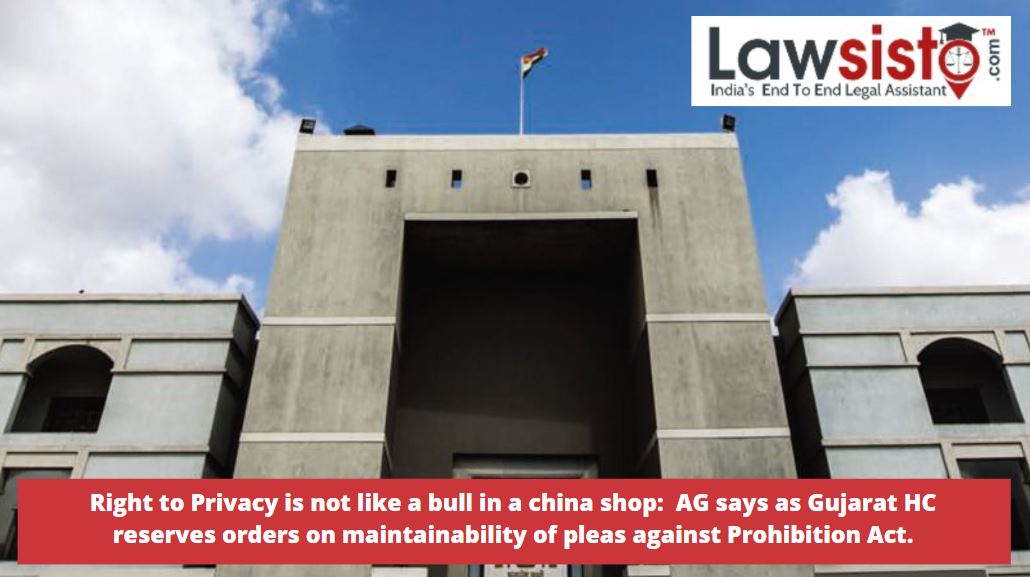Latest News
Right to Privacy is not like a bull in a china shop: AG says as Gujarat HC reserves orders on maintainability of pleas against Prohibition Act.

After listening to arguments on initial objections via way of means of the State for 3 days, the Gujarat High Court today reserved its order on maintainability of the plea contending the constitutional validity of the Gujarat Prohibition Act, 1949 (Peter Jagdish Nazareth v. the State of Gujarat). The order was reserved with the aid of using a Division Bench of Chief Justice Vikram Nath and Justice Biren Vaishnav. The petitioners together entreated the Court to soak up the problem on merits, arguing that the immediate mission to liquor prohibition in Gujarat changed into distinctive to the mission set up in State of Bombay & Anr v. FN Balsara, wherein the Supreme Court upheld the Act in 1951. Advocate General Kamal Trivedi argued that withinside the case of Balsara, the Supreme Court struck down provisions of the Act. Sections 12 and 13, which shape the essence of the Act, had been held invalid to a sure volume and the relaxation of the rules changed into upheld, he said. “Reading a judgment calls for discipline. One can't choose components of a judgment without context. The Supreme Court determined the regulations imposed with the aid of using the Act affordable in nature. Wherever modifications were affected withinside the Act, they're cosmetic in nature. The substance of the Act is preserved.”
Advocate Prakash Jani, arguing in favor of the rules, insisted that the humans of the State had been glad about prohibition and that it acted in favor of the deprived. “People within the State of Gujarat are very glad about prohibition; you ask the ones assisting the deprived sections of the society. Prohibition is the cause that Gujarat has maximum in line with capita income.” Jani seemed for an NGO that works with downtrodden women. Responding to arguments made with the aid of using Senior Advocate Mihir Joshi in yesterday’s listening to, the AG submitted, “The proper to consume non-veg inside 4 partitions of one’s home can't be as compared to ingesting intoxicating materials which can be injurious to health. Tomorrow a person may also argue that I am eating psychotropic materials inside my domestic and the State can't impose control.” He in addition argued that the proper to privateness is the situation to affordable regulations beneath neath the Constitution. “This idea of Right to Privacy isn't always like a bull in a china shop. It is the situation to affordable regulations primarily based totally on the social environment.
These regulations also are pondered withinside the judgments being stated with the aid of using the petitioners including KS Puttaswamy v. Union of India.” Advocate Devan Parikh, acting for one of the petitioners, submitted that a mission is best required to visit the Supreme Court if the prayer is concerning an assessment of the Supreme Court’s preceding judgment. “There isn't any precedent or ratio decidendi on what we're arguing. It is a clear mission." In aid of this submission, Mihir Joshi submitted, “Constitutional Rights and Right to Privacy aren't problems in which the State have to insist that the plea is going out on the threshold.”
Further, he argued that a brand new proper beneath neath the familiar umbrella of Article 21 has been conferred at the citizen with the aid of using manner of KS Puttaswamy, etc. and the Supreme Court in 1951 couldn't have determined withinside the bad on rights that got here into life in 2017. Senior Advocate Percy Kavina stated, “Reliance is being positioned on judgments greater than 1/2 of a century antique and this should constantly provide a manner to a brand new study the problem. Otherwise, Constitutional development will by no means take place.” Yesterday, suggest the petitioners raised questions surrounding the proper privateness of residents vis-a-vis the proper of the State to intrude with the same. Senior Advocate Joshi had argued, “What’s to forestall the State from entering our houses and saying, 'no non-veg from tomorrow'?” Senior Advocate Mihir Thakore prolonged the argument that the provisions beneath neath mission withinside the present-day pleas were amended through the years and are materially exclusive from what they had been in 1951.
Thakore additionally argued that the State can't interfere in sports being carried on within the privateness of residents' houses. “My number one submission is if I need to eat liquor in my domestic, the State does now no longer have a proper to lower my actions. The State can best lower if I am inflicting public nuisance including ingesting & driving.” Advocate General Kamal Trivedi on the opposite hand argued that the High Court can't take a seat down in enchantment over the Supreme Court’s choice in State of Bombay & Anr v. FN Balsara, wherein it upheld the vires of the 1949 Act.
Document:



































































































